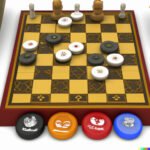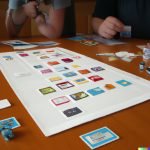Are you a fan of classic board games? Do names like Monopoly, Scrabble, and Clue bring back fond memories of family game nights and friendly competitions? In this article, we will delve into the timeless appeal of classic board games and explore their enduring popularity. From the ancient roots of these games to their modern adaptations, we will uncover the history and cultural impact of classic board games names.
Classic board games have been enjoyed by people of all ages for centuries, with their origins dating back to ancient civilizations. Over time, these traditional games have evolved and adapted to fit the changing preferences of players, but their fundamental appeal has remained constant. We will take a closer look at how classic board games have stood the test of time and continue to capture the imagination of players around the world.
In addition to their historical significance, classic board games hold a special place in many people’s hearts due to the nostalgia factor. The emotional connection that individuals feel towards these iconic names is undeniable, evoking cherished memories of bonding with friends and family over a competitive game night. Throughout this article, we will explore the deep-seated nostalgia associated with classic board games names and the role they play in shaping our cultural experiences.
History of Classic Board Games
Classic board games have a long and rich history that stretches back to ancient times. From the royal courts of Egypt to the bustling marketplaces of ancient China, board games have been a source of entertainment and competition for centuries. As civilizations evolved, so did the games they played, leading to the creation of some of the most iconic classic board games names we know today.
One of the earliest known classic board games is Senet, which originated in Ancient Egypt around 3100 BC. This game was not only played for entertainment but also had religious significance, with the belief that success in the game would lead to a successful journey through the afterlife.
Similarly, the game of Go has been played in China for over 2,500 years and remains popular to this day. Its simple yet strategic gameplay has made it a timeless classic in board gaming history.
Over time, classic board games continued to evolve and adapt, eventually leading to the creation of modern favorites like Monopoly and Scrabble. These names have become synonymous with family gatherings and friendly competitions, solidifying their place in popular culture. Other classic board games names such as Chess, Checkers, and Backgammon have also stood the test of time and continue to be enjoyed by people of all ages around the world.
The enduring appeal of classic board games names can be attributed to their ability to bring people together across generations and cultures. Whether it’s the thrill of buying properties in Monopoly or forming words in Scrabble, these timeless games hold a special place in many people’s hearts. Their historical significance and cultural impact make them more than just forms of entertainment-they are symbols of human connection and resilience.
Iconic Classic Board Games Names
The world of classic board games is filled with iconic names that have stood the test of time. From household favorites like Monopoly and Scrabble to lesser-known gems, these games have captured the hearts and minds of players for generations. In this section, we’ll take a closer look at some of the most iconic classic board game names and their enduring appeal.
Monopoly is perhaps one of the most recognizable classic board games of all time. Developed in the early 20th century, this game has become a staple in many households around the world. With its mix of strategy, luck, and negotiation, Monopoly continues to be a beloved classic that has even inspired various spin-offs and themed editions.
Scrabble is another classic board game name that has left a lasting impression on players young and old. With its focus on wordplay and vocabulary skills, Scrabble remains a favorite among families and language enthusiasts alike. The game’s simple yet challenging gameplay has contributed to its longevity and widespread popularity.
In addition to Monopoly and Scrabble, there are countless other classic board games names that have left their mark on the gaming world. From Clue to Risk to Chess, each game offers its own unique blend of entertainment and strategic thinking. These timeless names continue to bring people together, creating cherished memories that last a lifetime.
| Classic Board Game | Year Released |
|---|---|
| Monopoly | 1935 |
| Scrabble | 1938 |
| Chess | Ancient Origins |
Nostalgia Factor
When we think of classic board games names, a wave of nostalgia often washes over us. Games like Monopoly, Scrabble, and Clue hold a special place in many people’s hearts, bringing back cherished memories of family game nights and friendly competitions. These timeless names evoke feelings of joy, laughter, and bonding, creating an emotional connection that transcends generations.
The nostalgia factor is further heightened by the iconic imagery and design of these classic board games. From the colorful money in Monopoly to the distinctive wooden tiles in Scrabble, each game has its own unique elements that transport players back to simpler times. Even the smell of the game box can trigger fond recollections of evenings spent huddled around the kitchen table with loved ones.
For many, playing these classic board games names brings back memories of childhood innocence and carefree days. The simple act of rolling dice or strategically placing word tiles can transport players back to a time when life was less hectic and responsibilities were few. The emotional connection to these games is so strong that they continue to hold a special place in our lives, even as we grow older.
- The sense of nostalgia that classic board games names evoke
- How the iconic imagery and design enhance the emotional connection
- The way playing these games can transport players back to cherished memories
Enduring Popularity
The enduring popularity of classic board games names is a testament to their timeless appeal and undeniable charm. Across generations, these iconic games such as Monopoly, Scrabble, and Clue have continued to capture the hearts of players around the world. But what exactly is it about these classic board games names that make them stand the test of time?
One reason for their enduring popularity is the simplicity and universal nature of these games. Whether it’s rolling dice and moving pieces around a board or strategically placing tiles to form words, classic board games names are easy to understand and can be enjoyed by people of all ages. This accessibility ensures that they remain relevant in an ever-changing world.
Another factor contributing to their longevity is the social aspect of these games. Classic board games names often bring people together, fostering quality time with friends and family. The excitement, competition, and laughter that accompany game nights create lasting memories and strengthen bonds between players. This social element adds depth to the overall gaming experience, making it more meaningful and enjoyable.
It’s also worth noting that classic board games names often evoke a sense of nostalgia in individuals who have grown up playing them. Many people have fond memories associated with these games from their childhood, which creates an emotional connection that keeps them coming back for more. The familiarity and comfort provided by these classic board games names play a significant role in their enduring popularity.
| Reasons for Enduring Popularity | Examples |
|---|---|
| Universal appeal | Monopoly, Scrabble |
| Social aspect | Clue, Game of Life |
| Nostalgia factor | Candy Land, Chutes and Ladders |
Cultural Impact
Classic board games have left an indelible mark on society, influencing various aspects of culture and shaping social interaction. From promoting strategic thinking to fostering camaraderie, these games have played a pivotal role in shaping societal norms and behaviors.
Family Bonding and Social Skills
Classic board games have long been associated with bringing families together. Whether it’s a heated game of Monopoly or a friendly round of Scrabble, these timeless names provide opportunities for quality bonding time. Moreover, these games also help in the development of essential social skills such as patience, sportsmanship, and cooperation among players, thus contributing to positive social interactions within families and friend groups.
Educational Impact
Many classic board games are not just fun pastimes; they also offer valuable learning experiences. For instance, Scrabble enhances vocabulary and language skills, while chess improves critical thinking and problem-solving abilities. By combining entertainment with education, classic board games have become integral tools for cognitive development in both children and adults.
Pop Culture References
The influence of classic board games extends beyond the game itself and has permeated various forms of popular culture. From references in movies and television shows to being featured in art installations and literature, these iconic names have become ingrained in our collective consciousness. Their presence in popular media serves as a testament to their enduring impact on society as a whole.
Collecting Classic Board Games
Discovering Vintage Treasures
For many enthusiasts, collecting classic board games is not just a hobby, but a passionate pursuit of uncovering rare and vintage treasures. The thrill of hunting down rare names like original editions of Monopoly or first printings of Scrabble can be an exhilarating experience. Whether it’s scouring through flea markets, attending antique fairs, or bidding at online auctions, collectors enjoy the challenge of finding these elusive and valuable items.
Preserving History and Heritage
Beyond the excitement of the hunt, collecting classic board games also serves as a means of preserving history and heritage. Each game holds a piece of the past, reflecting the technological, social, and cultural trends of its time. By acquiring and maintaining these timeless names in their original form, collectors contribute to the conservation of our gaming heritage for future generations to appreciate and enjoy.
Connecting With Fellow Enthusiasts
Collecting classic board games is not just about amassing valuable items; it’s also about connecting with fellow enthusiasts who share the same passion. Whether through online forums, local meetups, or specialized events, collectors have the opportunity to bond over their love for classic board games names. This sense of community adds another layer of fulfillment to the collecting experience and offers opportunities for collaboration and knowledge-sharing among like-minded individuals.
Reviving Classic Board Games
In recent years, there has been a resurgence of interest in classic board games names, with many companies releasing modern versions of these timeless favorites. While the traditional edition of games like Monopoly and Scrabble still hold a special place in the hearts of players, the introduction of modern takes on these classic board games has injected new excitement into the gaming world.
One popular trend in reviving classic board games names is creating themed editions that cater to specific interests or fandoms. For example, there are now countless variations of Monopoly featuring different cities, movies, TV shows, and even pop culture icons. These themed editions add a fresh twist to the gameplay while capitalizing on the nostalgia and recognition of the original game.
Furthermore, modern iterations of classic board games often incorporate updated components, design elements, and game mechanics to appeal to contemporary audiences. From sleeker designs and higher-quality materials to innovative gameplay features and digital integrations, these modern takes breathe new life into beloved classics. By embracing technological advancements and catering to current consumer preferences, these revamped versions ensure that classic board games continue to captivate new generations of players.
Conclusion
In conclusion, the classic board games names discussed in this article have truly left a timeless legacy in the world of gaming. From ancient roots to modern adaptations, these iconic games such as Monopoly and Scrabble have captured the hearts of players for generations. The nostalgia factor associated with classic board games names creates an emotional connection that keeps bringing people back to these beloved titles time and time again.
The enduring popularity of classic board games names can be attributed to their simple yet engaging gameplay, making them accessible to players of all ages. Whether it’s the thrill of hunting down rare editions or experiencing modern takes on timeless names, there is a cultural impact that these games have had on society as a whole. They have brought families and friends together, sparking countless memories and moments of joy.
As we continue to embrace new forms of entertainment, it’s important not to overlook the significance of classic board games names. These games have a special place in our hearts and will continue to shape the way we connect with one another for years to come. So let’s continue to celebrate and preserve the legacy of these classic board games names, ensuring that they remain an integral part of our gaming culture for future generations to enjoy.
Frequently Asked Questions
What Is the Name of the Classic Board Game?
The classic board game that comes to mind for many people is Monopoly. It has been around for decades and is a staple in many households, known for its competitive and strategic gameplay.
What Is the Most Iconic Board Game?
When it comes to iconic board games, the most recognizable one would likely be Chess. With its origins dating back centuries, Chess is not only a game but also a symbol of strategy and intellect, making it truly iconic.
What Is the Most Popular Traditional Board Game?
The most popular traditional board game would have to be Scrabble. It’s a word game that has stood the test of time and continues to be enjoyed by people of all ages around the world. Its simple yet challenging nature contributes to its popularity.

I love playing all kinds of games – from classics like Monopoly to modern favourites like Ticket to Ride.
I created this blog as a way to share my love of board games with others, and provide information on the latest releases and news in the industry.





